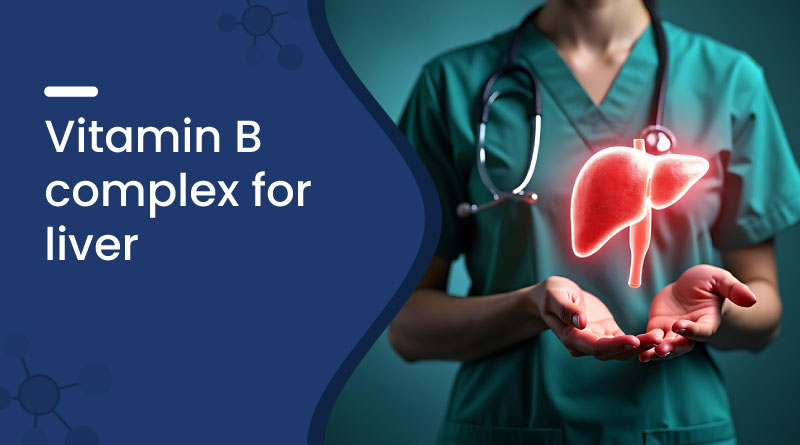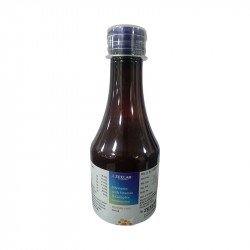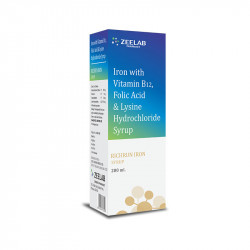Vitamin B Complex for Liver – Benefits & Uses for Liver Health


The liver is vital for detoxifying the body, supporting metabolism, and keeping overall health in balance. To function efficiently, it relies on essential nutrients, especially the vitamin B complex group. These vitamins help convert food into energy, support liver cell repair, and aid in detoxifying harmful substances. Deficiency in B vitamins can impair liver function, leading to fatigue, poor metabolism, and toxin buildup. Including vitamin B–rich foods or supplements can promote better liver health and long-term vitality.
Effects of Low Vitamin B Levels on the Liver
- Reduced detoxification efficiency.
- Increased risk of fatty liver and inflammation.
- Slower metabolism of nutrients.
- Fatigue and weakness due to poor energy production.
- Impaired liver cell regeneration.
How Vitamin B Complex Benefits the Liver?
- Supports detoxification: Helps break down toxins for easier elimination.
- Boosts energy metabolism: Converts carbohydrates, fats, and proteins into usable energy.
- Promotes liver cell repair: Encourages regeneration of damaged tissues.
- Reduces fat accumulation: Aids in breaking down fats and preventing fatty liver disease.
Each B vitamin in the B complex contributes to liver health in its own way, though some (B3, B6, B9, and B12) are more directly involved in liver-specific functions than others.
| Vitamin | Role in Liver Health |
|---|---|
| B1 (Thiamine) | Aids carbohydrate metabolism, giving the liver energy to work efficiently. |
| B2 (Riboflavin) | Protects liver cells from oxidative stress and supports fat metabolism. |
| B3 (Niacin) | Supports detox enzymes, regulates cholesterol, and helps prevent fatty liver. |
| B5 (Pantothenic Acid) | Produces coenzyme A for fat breakdown and detoxification. |
| B6 (Pyridoxine) | Processes amino acids and helps reduce inflammation in the liver. |
| B7 (Biotin) | Aids fat metabolism and helps prevent fat accumulation in the liver. |
| B9 (Folate) | Helps repair DNA and regenerate liver cells. |
| B12 (Cobalamin) | Works with folate for cell repair, reducing liver stress. |
Foods Rich in Vitamin B Complex
- Vitamin B1: Whole grains, legumes, sunflower seeds.
- Vitamin B2: Eggs, almonds, mushrooms.
- Vitamin B3: Peanuts, poultry, fish, ash gourd.
- Vitamin B6: Bananas, potatoes, spinach.
- Vitamin B7: Nuts, seeds, sweet potatoes.
- Vitamin B9: Leafy greens, lentils, citrus fruits.
- Vitamin B12: Found in dairy, fortified cereals, and nutritional yeast (suitable for vegetarians).
Also read - Ash Gourd Benefits for Liver
Most Important B Vitamins for Liver Health
B vitamins contribute to liver wellness by promoting metabolism, detoxification, and the repair of liver cells. Adequate intake of B3, B6, B9, and B12 helps protect liver cells, reduce inflammation, and promote efficient energy and nutrient processing.
Vitamin B Supplements for Liver Health
If dietary intake is insufficient, supplements may help restore healthy vitamin B levels. It’s best to consult a healthcare provider for the right dosage and combination, as individual needs vary based on diet, age, and health conditions.
| Zeelab Product | Key Features |
|---|---|
| Heptasil Plus Syrup | Milk thistle–based liver-support syrup with vitamin B complex for hepatic protection. |
Also read - Liver Detox Supplement India
Possible Side Effects of Excessive Vitamin B
While B vitamins are water-soluble and generally safe, excessive intake of supplements can cause:
- Nausea and digestive upset.
- Skin flushing (from excess niacin).
- Nerve damage (from extremely high B6 doses).
- Liver stress in case of very high supplement intake over time.
Lifestyle Tips to Improve Liver Function
- Keep your diet balanced by focusing on fresh produce and whole grains.
- Limit alcohol and avoid smoking.
- Stay hydrated for better toxin elimination.
- Exercise regularly to improve metabolism.
- Manage stress to prevent hormonal imbalances that affect liver function.
- Get regular health checkups and liver function tests.
Other Factors Affecting Vitamin B Absorption
- Excessive alcohol intake reduces vitamin absorption.
- Certain medications may interfere with B vitamin metabolism.
- Digestive disorders like celiac disease or IBS may lower nutrient absorption.
Conclusion
Vitamin B complex plays a vital role in maintaining liver health by supporting detoxification, metabolism, and cell repair. Deficiency can lead to fatigue, inflammation, and reduced liver efficiency. Including vitamin-rich foods, using supplements when needed, and adopting healthy lifestyle habits can keep your liver strong and functional for years to come.
Frequently Asked Questions (FAQs)
Q. How does Vitamin B complex help the liver?
A. Vitamin B complex supports the liver by aiding detoxification, boosting energy metabolism, repairing liver cells, and preventing fat buildup. It also improves nutrient processing, reduces inflammation, and protects liver tissues from oxidative
damage, promoting overall liver health.
Q. Which B vitamins help keep the liver healthy?
A. While all B vitamins support liver health, B3, B6, B9, and B12 have more direct benefits. They assist in detoxification, cholesterol metabolism, inflammation reduction, DNA repair, and red blood cell production, helping the liver function efficiently and stay healthy.
Q. How do I know if a low vitamin B level is affecting my liver?
A. Low vitamin B levels can reduce detoxification efficiency, slow nutrient metabolism, increase fatty liver risk, impair cell regeneration, and cause fatigue. Over time, deficiencies may lead to inflammation, toxin buildup, and decreased overall liver function and resilience.
Q. What foods are rich in Vitamin B for liver health?
A. Foods rich in vitamin B include whole grains, legumes, eggs, nuts, seeds, leafy greens, poultry, dairy, mushrooms, and fortified cereals. Including a variety of these in your diet helps maintain optimal liver health and prevent deficiencies.
Q. Can vitamin B12 help improve liver health?
A. Vitamin B12 contributes to liver wellness by assisting in red blood cell formation, DNA repair, and liver cell restoration. Maintaining proper levels helps control inflammation, improve liver detoxification, and guard against fatty liver.
Silymarin (35 mg) + Vitamin B1 (1.5 mg) + Vitamin B2 (1.5 mg) + Vitamin B6 (1.5 mg) + Vitamin B12 (1 mcg) + Niacinamide (20 mg) + Calcium Pantothenate (5 mg)
200ml In 1 bottle
Iron (60 mg) + Folic Acid (1 mg) + Vitamin B12 (0.005 mg) + Lysine (70 mg)
200 ml. Syrup
Recent Blogs
Disclaimer : Zeelab Pharmacy provides health information for knowledge only. Do not self-medicate. Always consult a qualified doctor before starting, stopping, or changing any medicine or treatment.


















 Added!
Added!